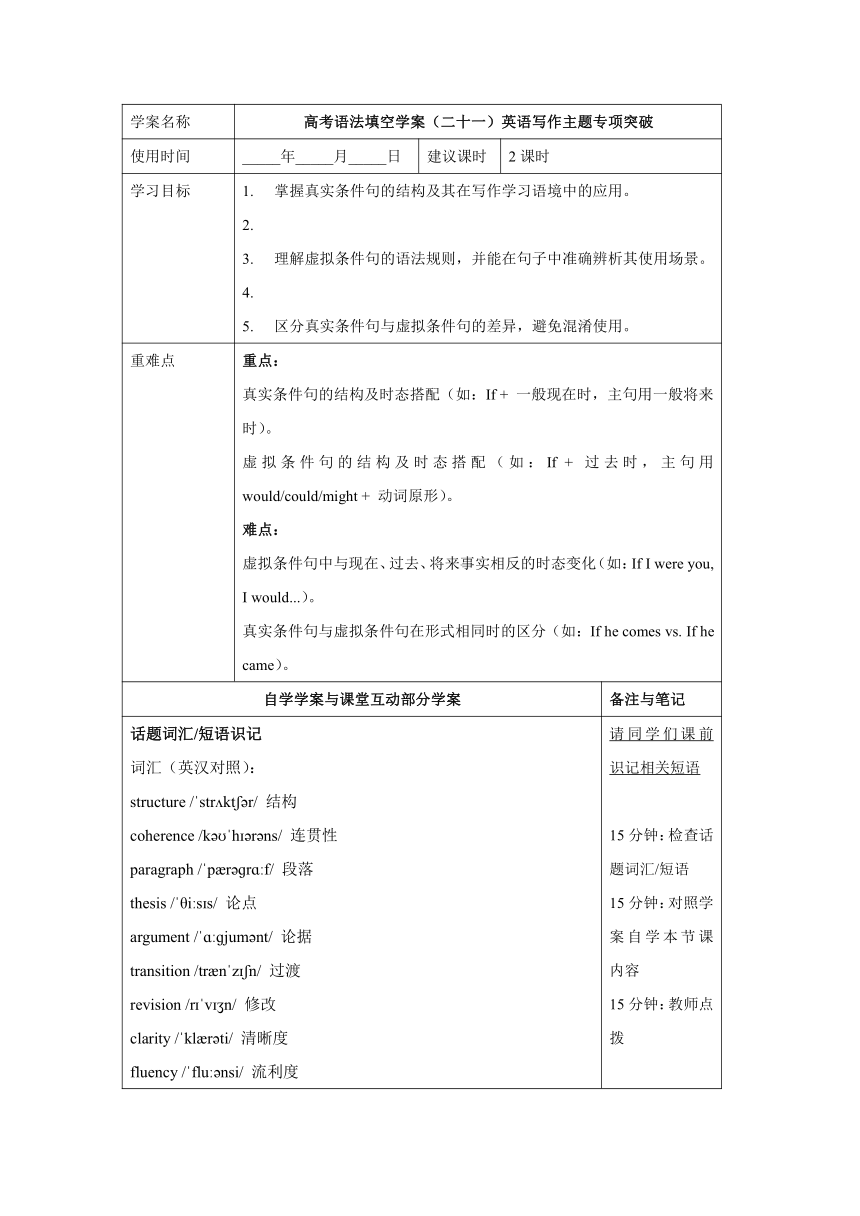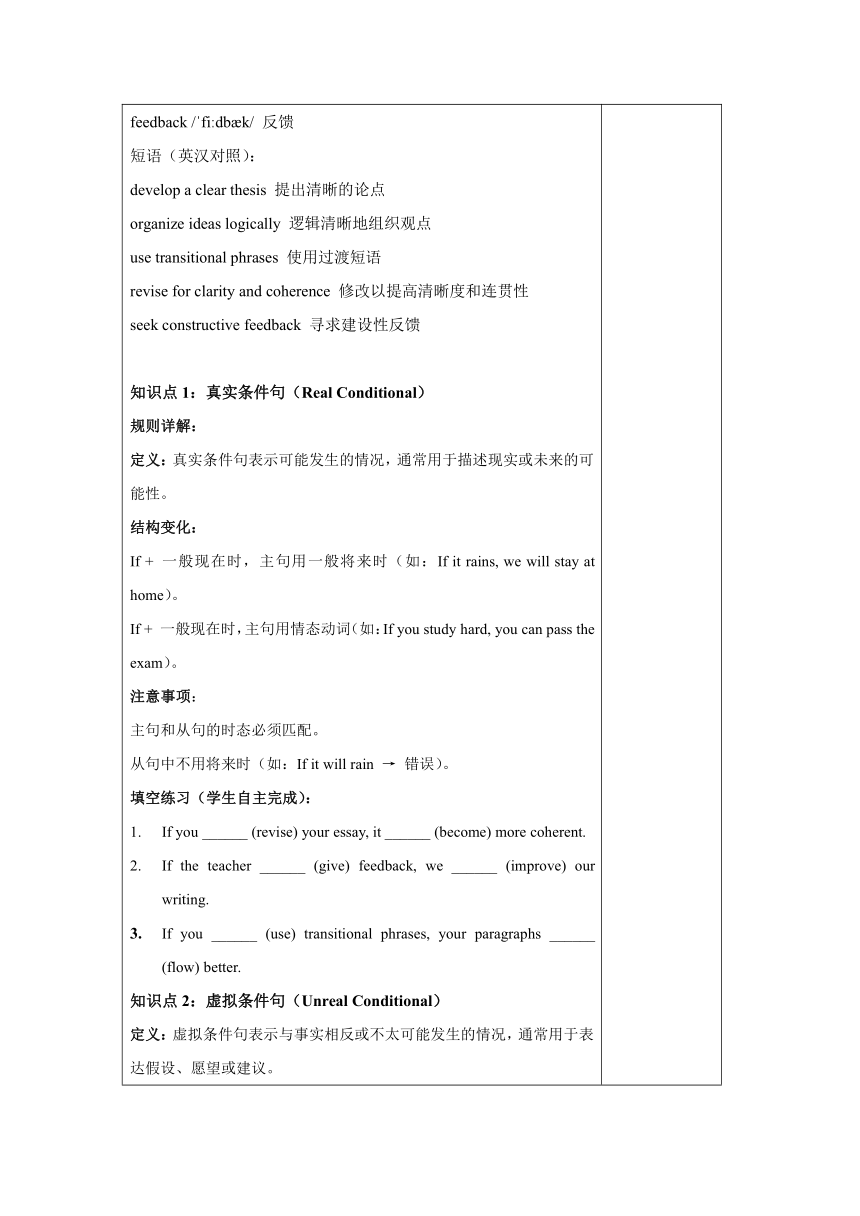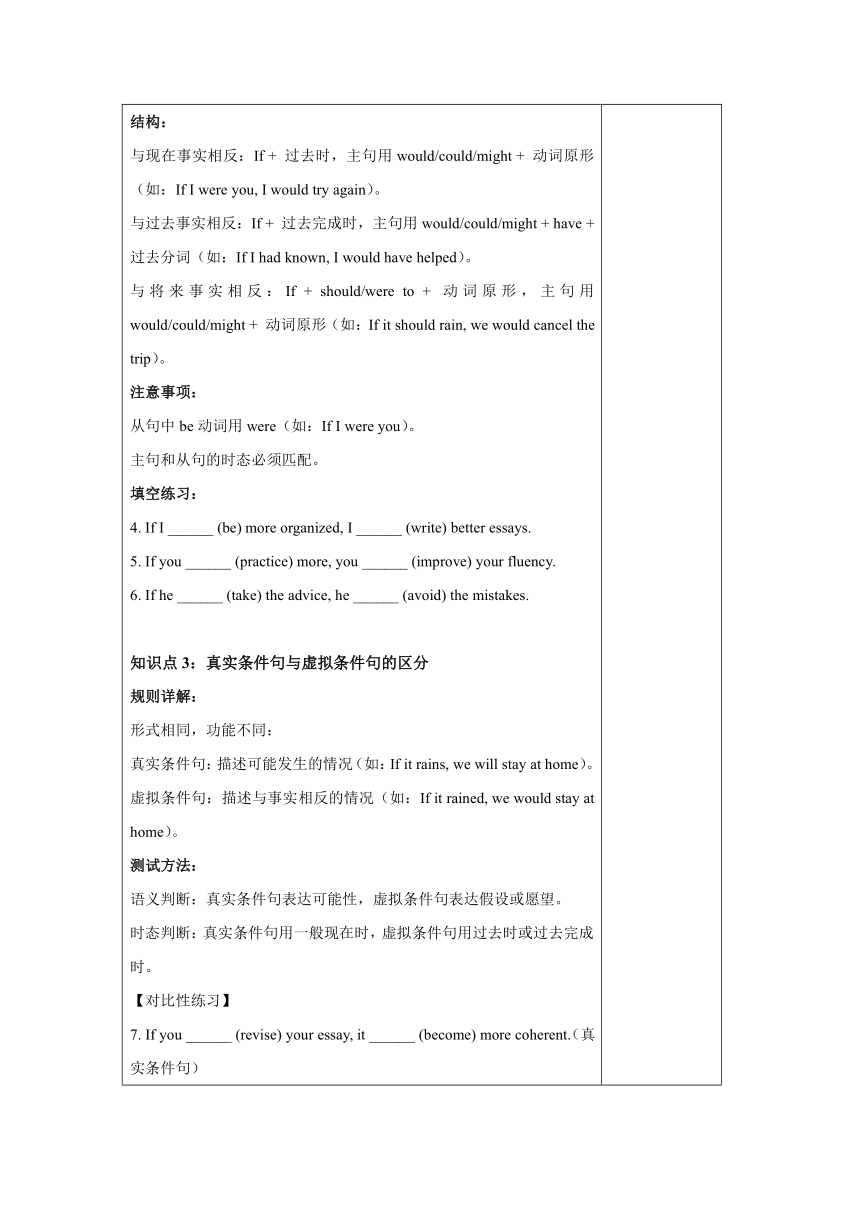2025届高考语法填空学案(二十一)英语写作主题专项突破(含解析)
文档属性
| 名称 | 2025届高考语法填空学案(二十一)英语写作主题专项突破(含解析) |

|
|
| 格式 | docx | ||
| 文件大小 | 28.6KB | ||
| 资源类型 | 教案 | ||
| 版本资源 | 人教版(2019) | ||
| 科目 | 英语 | ||
| 更新时间 | 2025-02-11 00:00:00 | ||
图片预览



文档简介
学案名称 高考语法填空学案(二十一)英语写作主题专项突破
使用时间 _____年_____月_____日 建议课时 2课时
学习目标 掌握真实条件句的结构及其在写作学习语境中的应用。 理解虚拟条件句的语法规则,并能在句子中准确辨析其使用场景。 区分真实条件句与虚拟条件句的差异,避免混淆使用。
重难点 重点: 真实条件句的结构及时态搭配(如:If + 一般现在时,主句用一般将来时)。 虚拟条件句的结构及时态搭配(如:If + 过去时,主句用would/could/might + 动词原形)。 难点: 虚拟条件句中与现在、过去、将来事实相反的时态变化(如:If I were you, I would...)。 真实条件句与虚拟条件句在形式相同时的区分(如:If he comes vs. If he came)。
自学学案与课堂互动部分学案 备注与笔记
话题词汇/短语识记 词汇(英汉对照): structure / str kt r/ 结构 coherence /k h r ns/ 连贯性 paragraph / p r ɡrɑ f/ 段落 thesis / θi s s/ 论点 argument / ɑ ɡjum nt/ 论据 transition /tr n z n/ 过渡 revision /r v n/ 修改 clarity / kl r ti/ 清晰度 fluency / flu nsi/ 流利度 feedback / fi db k/ 反馈 短语(英汉对照): develop a clear thesis 提出清晰的论点 organize ideas logically 逻辑清晰地组织观点 use transitional phrases 使用过渡短语 revise for clarity and coherence 修改以提高清晰度和连贯性 seek constructive feedback 寻求建设性反馈 知识点1:真实条件句(Real Conditional) 规则详解: 定义:真实条件句表示可能发生的情况,通常用于描述现实或未来的可能性。 结构变化: If + 一般现在时,主句用一般将来时(如:If it rains, we will stay at home)。 If + 一般现在时,主句用情态动词(如:If you study hard, you can pass the exam)。 注意事项: 主句和从句的时态必须匹配。 从句中不用将来时(如:If it will rain → 错误)。 填空练习(学生自主完成): If you ______ (revise) your essay, it ______ (become) more coherent. If the teacher ______ (give) feedback, we ______ (improve) our writing. If you ______ (use) transitional phrases, your paragraphs ______ (flow) better. 知识点2:虚拟条件句(Unreal Conditional) 定义:虚拟条件句表示与事实相反或不太可能发生的情况,通常用于表达假设、愿望或建议。 结构: 与现在事实相反:If + 过去时,主句用would/could/might + 动词原形(如:If I were you, I would try again)。 与过去事实相反:If + 过去完成时,主句用would/could/might + have + 过去分词(如:If I had known, I would have helped)。 与将来事实相反:If + should/were to + 动词原形,主句用would/could/might + 动词原形(如:If it should rain, we would cancel the trip)。 注意事项: 从句中be动词用were(如:If I were you)。 主句和从句的时态必须匹配。 填空练习: 4. If I ______ (be) more organized, I ______ (write) better essays. 5. If you ______ (practice) more, you ______ (improve) your fluency. 6. If he ______ (take) the advice, he ______ (avoid) the mistakes. 知识点3:真实条件句与虚拟条件句的区分 规则详解: 形式相同,功能不同: 真实条件句:描述可能发生的情况(如:If it rains, we will stay at home)。 虚拟条件句:描述与事实相反的情况(如:If it rained, we would stay at home)。 测试方法: 语义判断:真实条件句表达可能性,虚拟条件句表达假设或愿望。 时态判断:真实条件句用一般现在时,虚拟条件句用过去时或过去完成时。 【对比性练习】 7. If you ______ (revise) your essay, it ______ (become) more coherent.(真实条件句) 8. If you ______ (revise) your essay, it ______ (be) more coherent now.(虚拟条件句) 9. If he ______ (take) the advice, he ______ (avoid) the mistakes.(虚拟条件句) 【课堂内容回顾】请梳理本节课的疑难知识点,以便巩固训练课时进行训练与巩固 请同学们课前识记相关短语 15分钟:检查话题词汇/短语 15分钟:对照学案自学本节课内容 15分钟:教师点拨
巩固训练学案 备注与笔记
【知识框架搭建】请同学们搭建本节课的知识框架 【巩固训练】 单句语法填空(10题) If you ______ (practice) daily, your writing ______ (improve). If the teacher ______ (give) feedback, we ______ (improve) our essays. If you ______ (use) transitional phrases, your paragraphs ______ (flow) better. If I ______ (be) more confident, I ______ (write) more creatively. If he ______ (take) the advice, he ______ (avoid) the mistakes. If it ______ (rain), we ______ (cancel) the outdoor activity. If you ______ (revise) your essay, it ______ (become) more coherent. If she ______ (be) more organized, she ______ (write) better essays. If they ______ (practice) more, they ______ (improve) their fluency. If we ______ (use) more examples, our arguments ______ (be) stronger. 单句语法填空·拔高练习 If you ______ (revise) your essay, it ______ (be) more coherent now. If he ______ (take) the advice, he ______ (avoid) the mistakes yesterday. If I ______ (be) more organized, I ______ (write) better essays last week. If it ______ (rain) tomorrow, we ______ (cancel) the outdoor activity. If she ______ (practice) more, she ______ (improve) her fluency by now. 语篇语法填空(10空) 阅读下面短文,在空白处填入1个适当的单词或括号内单词的正确形式。 If you ______ (practice) writing daily, your skills ______ (improve). If the teacher ______ (give) feedback, we ______ (improve) our essays. If you ______ (use) transitional phrases, your paragraphs ______ (flow) better. If I ______ (be) more confident, I ______ (write) more creatively. If he ______ (take) the advice, he ______ (avoid) the mistakes. If it ______ (rain), we ______ (cancel) the outdoor activity. If you ______ (revise) your essay, it ______ (become) more coherent. If she ______ (be) more organized, she ______ (write) better essays. If they ______ (practice) more, they ______ (improve) their fluency. If we ______ (use) more examples, our arguments ______ (be) stronger. 【检查目标是否达成】 能够读懂英语写作学习的相关文章( ) 学生能够熟练区分真实条件句和虚拟条件句 ( ) 强化语法填空实战能力。 ( ) 本节课结束后,教师会下发巩固训练学案的答案,有疑问的同学,可以对照解析进行进一步修改。祝同学们学习顺利! 请同学们完成后进行小组讨论。请有展示任务的同学在黑板上书写你的答案。 拔高练习部分,难度较大。请英语A层级完成,其余同学可选做。
答案与解析(教师注意保留此部分)
单句语法填空答案与解析:
practice; will improve(真实条件句,一般现在时+一般将来时)。
gives; will improve(真实条件句,一般现在时+一般将来时)。
use; will flow(真实条件句,一般现在时+一般将来时)。
were; would write(虚拟条件句,与现在事实相反)。
had taken; would have avoided(虚拟条件句,与过去事实相反)。
rains; will cancel(真实条件句,一般现在时+一般将来时)。
revise; will become(真实条件句,一般现在时+一般将来时)。
were; would write(虚拟条件句,与现在事实相反)。
practiced; would improve(虚拟条件句,与现在事实相反)。
use; will be(真实条件句,一般现在时+一般将来时)。
拔高单句语法填空答案与解析:
had revised; would be(虚拟条件句,与过去事实相反)。
had taken; would have avoided(虚拟条件句,与过去事实相反)。
had been; would have written(虚拟条件句,与过去事实相反)。
rains; will cancel(真实条件句,一般现在时+一般将来时)。
had practiced; would have improved(虚拟条件句,与过去事实相反)。
语篇填空答案与解析:
practice; will improve(真实条件句,一般现在时+一般将来时)。
gives; will improve(真实条件句,一般现在时+一般将来时)。
use; will flow(真实条件句,一般现在时+一般将来时)。
were; would write(虚拟条件句,与现在事实相反)。
had taken; would have avoided(虚拟条件句,与过去事实相反)。
rains; will cancel(真实条件句,一般现在时+一般将来时)。
revise; will become(真实条件句,一般现在时+一般将来时)。
were; would write(虚拟条件句,与现在事实相反)。
practiced; would improve(虚拟条件句,与现在事实相反)。
use; will be(真实条件句,一般现在时+一般将来时)。
使用时间 _____年_____月_____日 建议课时 2课时
学习目标 掌握真实条件句的结构及其在写作学习语境中的应用。 理解虚拟条件句的语法规则,并能在句子中准确辨析其使用场景。 区分真实条件句与虚拟条件句的差异,避免混淆使用。
重难点 重点: 真实条件句的结构及时态搭配(如:If + 一般现在时,主句用一般将来时)。 虚拟条件句的结构及时态搭配(如:If + 过去时,主句用would/could/might + 动词原形)。 难点: 虚拟条件句中与现在、过去、将来事实相反的时态变化(如:If I were you, I would...)。 真实条件句与虚拟条件句在形式相同时的区分(如:If he comes vs. If he came)。
自学学案与课堂互动部分学案 备注与笔记
话题词汇/短语识记 词汇(英汉对照): structure / str kt r/ 结构 coherence /k h r ns/ 连贯性 paragraph / p r ɡrɑ f/ 段落 thesis / θi s s/ 论点 argument / ɑ ɡjum nt/ 论据 transition /tr n z n/ 过渡 revision /r v n/ 修改 clarity / kl r ti/ 清晰度 fluency / flu nsi/ 流利度 feedback / fi db k/ 反馈 短语(英汉对照): develop a clear thesis 提出清晰的论点 organize ideas logically 逻辑清晰地组织观点 use transitional phrases 使用过渡短语 revise for clarity and coherence 修改以提高清晰度和连贯性 seek constructive feedback 寻求建设性反馈 知识点1:真实条件句(Real Conditional) 规则详解: 定义:真实条件句表示可能发生的情况,通常用于描述现实或未来的可能性。 结构变化: If + 一般现在时,主句用一般将来时(如:If it rains, we will stay at home)。 If + 一般现在时,主句用情态动词(如:If you study hard, you can pass the exam)。 注意事项: 主句和从句的时态必须匹配。 从句中不用将来时(如:If it will rain → 错误)。 填空练习(学生自主完成): If you ______ (revise) your essay, it ______ (become) more coherent. If the teacher ______ (give) feedback, we ______ (improve) our writing. If you ______ (use) transitional phrases, your paragraphs ______ (flow) better. 知识点2:虚拟条件句(Unreal Conditional) 定义:虚拟条件句表示与事实相反或不太可能发生的情况,通常用于表达假设、愿望或建议。 结构: 与现在事实相反:If + 过去时,主句用would/could/might + 动词原形(如:If I were you, I would try again)。 与过去事实相反:If + 过去完成时,主句用would/could/might + have + 过去分词(如:If I had known, I would have helped)。 与将来事实相反:If + should/were to + 动词原形,主句用would/could/might + 动词原形(如:If it should rain, we would cancel the trip)。 注意事项: 从句中be动词用were(如:If I were you)。 主句和从句的时态必须匹配。 填空练习: 4. If I ______ (be) more organized, I ______ (write) better essays. 5. If you ______ (practice) more, you ______ (improve) your fluency. 6. If he ______ (take) the advice, he ______ (avoid) the mistakes. 知识点3:真实条件句与虚拟条件句的区分 规则详解: 形式相同,功能不同: 真实条件句:描述可能发生的情况(如:If it rains, we will stay at home)。 虚拟条件句:描述与事实相反的情况(如:If it rained, we would stay at home)。 测试方法: 语义判断:真实条件句表达可能性,虚拟条件句表达假设或愿望。 时态判断:真实条件句用一般现在时,虚拟条件句用过去时或过去完成时。 【对比性练习】 7. If you ______ (revise) your essay, it ______ (become) more coherent.(真实条件句) 8. If you ______ (revise) your essay, it ______ (be) more coherent now.(虚拟条件句) 9. If he ______ (take) the advice, he ______ (avoid) the mistakes.(虚拟条件句) 【课堂内容回顾】请梳理本节课的疑难知识点,以便巩固训练课时进行训练与巩固 请同学们课前识记相关短语 15分钟:检查话题词汇/短语 15分钟:对照学案自学本节课内容 15分钟:教师点拨
巩固训练学案 备注与笔记
【知识框架搭建】请同学们搭建本节课的知识框架 【巩固训练】 单句语法填空(10题) If you ______ (practice) daily, your writing ______ (improve). If the teacher ______ (give) feedback, we ______ (improve) our essays. If you ______ (use) transitional phrases, your paragraphs ______ (flow) better. If I ______ (be) more confident, I ______ (write) more creatively. If he ______ (take) the advice, he ______ (avoid) the mistakes. If it ______ (rain), we ______ (cancel) the outdoor activity. If you ______ (revise) your essay, it ______ (become) more coherent. If she ______ (be) more organized, she ______ (write) better essays. If they ______ (practice) more, they ______ (improve) their fluency. If we ______ (use) more examples, our arguments ______ (be) stronger. 单句语法填空·拔高练习 If you ______ (revise) your essay, it ______ (be) more coherent now. If he ______ (take) the advice, he ______ (avoid) the mistakes yesterday. If I ______ (be) more organized, I ______ (write) better essays last week. If it ______ (rain) tomorrow, we ______ (cancel) the outdoor activity. If she ______ (practice) more, she ______ (improve) her fluency by now. 语篇语法填空(10空) 阅读下面短文,在空白处填入1个适当的单词或括号内单词的正确形式。 If you ______ (practice) writing daily, your skills ______ (improve). If the teacher ______ (give) feedback, we ______ (improve) our essays. If you ______ (use) transitional phrases, your paragraphs ______ (flow) better. If I ______ (be) more confident, I ______ (write) more creatively. If he ______ (take) the advice, he ______ (avoid) the mistakes. If it ______ (rain), we ______ (cancel) the outdoor activity. If you ______ (revise) your essay, it ______ (become) more coherent. If she ______ (be) more organized, she ______ (write) better essays. If they ______ (practice) more, they ______ (improve) their fluency. If we ______ (use) more examples, our arguments ______ (be) stronger. 【检查目标是否达成】 能够读懂英语写作学习的相关文章( ) 学生能够熟练区分真实条件句和虚拟条件句 ( ) 强化语法填空实战能力。 ( ) 本节课结束后,教师会下发巩固训练学案的答案,有疑问的同学,可以对照解析进行进一步修改。祝同学们学习顺利! 请同学们完成后进行小组讨论。请有展示任务的同学在黑板上书写你的答案。 拔高练习部分,难度较大。请英语A层级完成,其余同学可选做。
答案与解析(教师注意保留此部分)
单句语法填空答案与解析:
practice; will improve(真实条件句,一般现在时+一般将来时)。
gives; will improve(真实条件句,一般现在时+一般将来时)。
use; will flow(真实条件句,一般现在时+一般将来时)。
were; would write(虚拟条件句,与现在事实相反)。
had taken; would have avoided(虚拟条件句,与过去事实相反)。
rains; will cancel(真实条件句,一般现在时+一般将来时)。
revise; will become(真实条件句,一般现在时+一般将来时)。
were; would write(虚拟条件句,与现在事实相反)。
practiced; would improve(虚拟条件句,与现在事实相反)。
use; will be(真实条件句,一般现在时+一般将来时)。
拔高单句语法填空答案与解析:
had revised; would be(虚拟条件句,与过去事实相反)。
had taken; would have avoided(虚拟条件句,与过去事实相反)。
had been; would have written(虚拟条件句,与过去事实相反)。
rains; will cancel(真实条件句,一般现在时+一般将来时)。
had practiced; would have improved(虚拟条件句,与过去事实相反)。
语篇填空答案与解析:
practice; will improve(真实条件句,一般现在时+一般将来时)。
gives; will improve(真实条件句,一般现在时+一般将来时)。
use; will flow(真实条件句,一般现在时+一般将来时)。
were; would write(虚拟条件句,与现在事实相反)。
had taken; would have avoided(虚拟条件句,与过去事实相反)。
rains; will cancel(真实条件句,一般现在时+一般将来时)。
revise; will become(真实条件句,一般现在时+一般将来时)。
were; would write(虚拟条件句,与现在事实相反)。
practiced; would improve(虚拟条件句,与现在事实相反)。
use; will be(真实条件句,一般现在时+一般将来时)。
